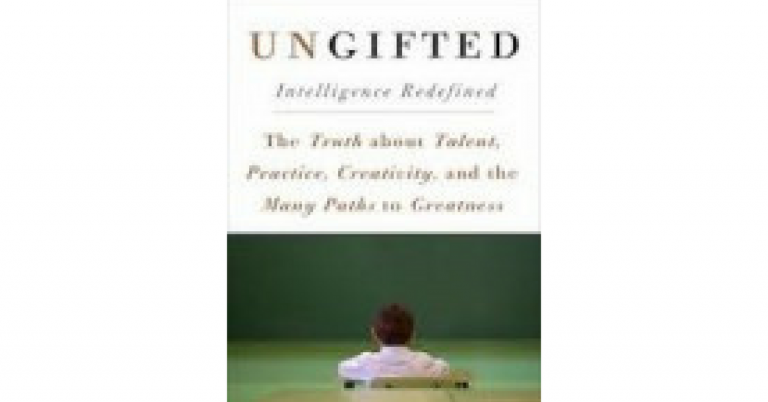
Ungifted: Intelligence Redefined
What are intelligence, creativity, and talent? How can we measure them? Are they innate, or learned? And how can we each uncover our own?
Scott Barry Kaufman tackles all of these important questions and many more in Ungifted: Intelligence Redefined.
I found the book compelling, well-researched, and powerful, especially because Kaufman speaks both from his professional expertise as a cognitive psychologist and his own life experience. Growing up, he went from ‘special’ classes to becoming a NYU professor and author.
Let me give you a short summary and a few suggestions for actions:
IQ is not everything.
Even before the first chapter, Kaufman makes a paradigm-shifting point when he writes that intelligence is not zero sum game.
“[…] just because someone is talented (whatever that means) by the standards set by society doesn’t mean that the person who isn’t doesn’t have dynamic potential for intellectual functioning. There are so many different paths to success.”
IQ – society’s current standard for measuring intelligence – then is only one part of a rich and dynamic picture in which heritable traits, behavior, mindset, opportunity, perseverance, and motivation all play together.
I was delighted to find Kaufman addressing passion as well, a factor not often considered by academic researchers. For example, he shares:
“One study found that the state of inspiration predicted the creativity of writing above and beyond sheer effort and SAT verbal scores.”
Success and the Growth Mindset
Through much of the first 6 chapters, I kept thinking of Carol Dweck’s work on the “growth mindset” and Kaufman turns his attention here in chapter 7.
He sheds light on what others including Dweck and Heidi Grant Halvorson have found in their research: When we set goals focused on improving we are more resilient to setbacks than when we have goals focused on demonstrating ability. When we are focused on learning and the journey, we tend to stay more engaged. We pay more attention to feedback, learn more from it, and perform better in the long run.
Suggested actions:
- Set a goal for yourself to learn something new and/or become better at a skill. Focus on and enjoy your progress, and don’t get attached to the idea of completely mastering the skill.
- If you manage a team make it a point to praise effort at least as much as accomplishments to foster a growth mindset.
Does self-control trump IQ?
On the flipside, social comparison and status threats almost always negatively impact confidence, brain function, and performance.
So, how can we regulate these negative factors to perform better?
One study Kaufman shares found participants who wrote about their emotions about an upcoming challenge performed better on the task. It may be that the writing helped them reinterpret their negative emotions and prepare for action.
Self-regulation may even be one of the more important factors in academic success, a field in which society most often refers to IQ. Kaufman argues:
“There is suggestive evidence that when analyzed independently of IQ, self-discipline predicts academic achievement better than IQ.”
Suggested actions:
- Write down how you feel about your next upcoming challenge. How does that change your perspective on those emotions?
- Abundant research suggests that, as I’ve written about previously, meditation is one great way to boost self-control. There are many ways to meditate, and even a few minutes each day can be effective.
Happiness at Work and Creativity
In the context of talent, Kaufman’s thoughts about creativity are particularly important to me, and I found this statement fascinating:
“Openness is a stronger predictor of creative achievement across the board compared to Intellect.”
Kaufman also suggests that people who are the most creative love their work. They have a sense of mission. They think deeply, tolerate mistakes, and are comfortable holding minority opinions. They have a passion that drives persistence.
As you can imagine, this resonated strongly with me.
Suggested actions:
- Create your own action plan for becoming happier at work.
- Define how your work supports a bigger mission that is aligned with your own values and goals. If you are a manager, have this conversation with your team members.
So, what is intelligence?
Kaufman sums it up with this redefinition:
“Intelligence is the dynamic interplay of engagement and abilities in pursuit of personal goals….engagement and ability are inseparable throughout human development, dynamically feeding off each other as we engage in the world.”
Who should read this book?
I recommend the book as a place to start for anyone who wants to work smarter, be more creative, and achieve more. If you are a bit of a geek like me, you’ll enjoy it more – it’s fairly academic and often describes studies in detail, perhaps too much for some. Overall it is an excellent and fascinating book.
If anyone would like a book summary I wrote that’s somewhat longer than this post, please contact us to receive it.
I’d love to hear what you think and how you apply these insights.
(The link to the book is an affiliate link and will take you to its listing on Amazon.)